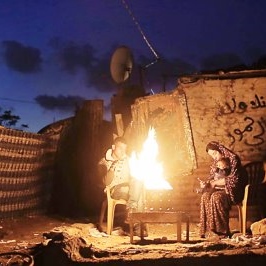
News

So much more than just paying electrical bills
PAULA SLIER
We’ll probably have to wait until he’s 40 and is granted permission to cross the Erez Crossing into southern Israel, before we can say our first hello face-to-face. Lately, his cell phone is off more than it’s on and his life centres on the three-to-four hours of electricity he receives each day.
For the almost two million people living in Gaza, these hours are a lifeline – and a luxury. The Gaza Strip’s sole power plant shut down in April after it ran out of fuel and no one has come forward to foot the bill.
Egyptian electricity lines feeding southern Gaza, are constantly breaking down because of the ongoing battles between the Egyptian military and ISIS close to the Gaza border. And now, at the request of the Palestinian Authority (PA), Israel has scaled down its electricity supplies to the Strip to at least 40 per cent of its former levels. The original PA request to Jerusalem was to cut supplies completely.
It’s a sorry story to begin with. The Gaza Strip requires 450 megawatts daily, and before the cuts, was receiving only around 150. The power plant has not run at full capacity in years and Israel’s blockade has severely limited fuel imports.
Until now, the PA has been paying Israel for the electricity it provides to Gaza. Hamas argues the PA government in Ramallah rules Gaza and so this is their responsibility. But the reality is that Hamas is in charge of the coastal enclave and even collects electricity bills from residents.
It appears that Palestinian Authority President Mahmoud Abbas has finally had enough.
Most observers believe Abbas’ decision to stop paying the Israel Electric Corporation, is an attempt to settle old scores. They think he wants to cripple the rival Hamas leadership as it marks 10 years of controlling Gaza after booting Fatah officials out.
I covered the civil war at the time and I remember interviewing a Gaza schoolteacher who was a supporter of Fatah. We filmed at his home where his six children crowded around us, and his wife shyly watched from the doorway. He begged me not to mention his political convictions as he was convinced this would get him fired.
There was real support for Hamas at the time. For years, they’d run schools, hospitals and food banks and delivered on much more than had the ruling Fatah party of former Palestinian leader Yasser Arafat.
But Israeli observers said then that Gazans would inevitably get fed up with Hamas. It seemed unlikely, but as politics the world over has repeatedly proven, it’s always easier to sit in the opposition than be in power.
Hamas has increasingly been unable to deliver on promises – and while 10 years ago Gaza’s population was around 1,4 million, today it numbers more than two million.
Abbas’ decision follows other recent cuts he’s made to PA officials in Gaza, including financial support for released prisoners and medical payments. The cuts come after his meetings with US President Donald Trump, which is why some suggest these moves were agreed to behind closed doors.
Abbas is certainly emboldened after wandering in the political wilderness for a long time and being thrown a lifeline by Trump.
But, where does this leave Israel? With the strong possibility, many believe, that frustrated Gazans will direct their anger towards the Jewish State.
Hamas warned Jerusalem that its decision to accede to Abbas’ request, would be “disastrous and dangerous” and could lead to an outbreak of violence. Its spokesman, Sami Abu Zuhri, said Israel would “bear responsibility for the consequences of the reduction”.
But, ask Israelis what they think and many say this is not Israel’s problem to begin with. “Why should we be providing them with electricity in the first place?” they challenge me.
“Because,” my colleague, Ahmed, in Gaza retorts, “you control our waters, our airspace, our borders. We wouldn’t be in this position if it wasn’t for the Israeli occupation.”
Senior Israeli officials, including Defence Minister Avigdor Lieberman, have said Israel cannot step into the PA’s shoes and pay off its debts. Prime Minister Benjamin Netanyahu has stressed the country is not party to internal Palestinian disputes and does not want war.
The last thing Netanyahu needs is to be seen by his right-wing support base as capitulating to Palestinian threats.
Hamas is also unlikely to be gunning for war. It’s more isolated than ever in the Arab world and faces the possibility of losing a main donor – Qatar – as that country faces its own embargo from Saudi Arabia and others.
But while war might not be either side’s stated objective, it might be that Israel and Hamas are getting closer to one, whether they like it or not.
Paula Slier is the Middle East Bureau Chief of RT, the founder and CEO of NewshoundMedia and the inaugural winner of the Europcar Woman in Leadership Award of the South African Absa Jewish Achievers.





yitzchak
June 22, 2017 at 2:14 pm
‘Funny how Hamas has enough money for tunnels and rockets.
This piece is a deft legerdemain .When the Gazans wan’t to settle the conflict they will do so.
The occupation of Gaza ended years ago.
So we should make it easier for them to kill us? Huh!
During the last blood letting in2004 they could have surrendered at any time.
Life for them means nothing.’